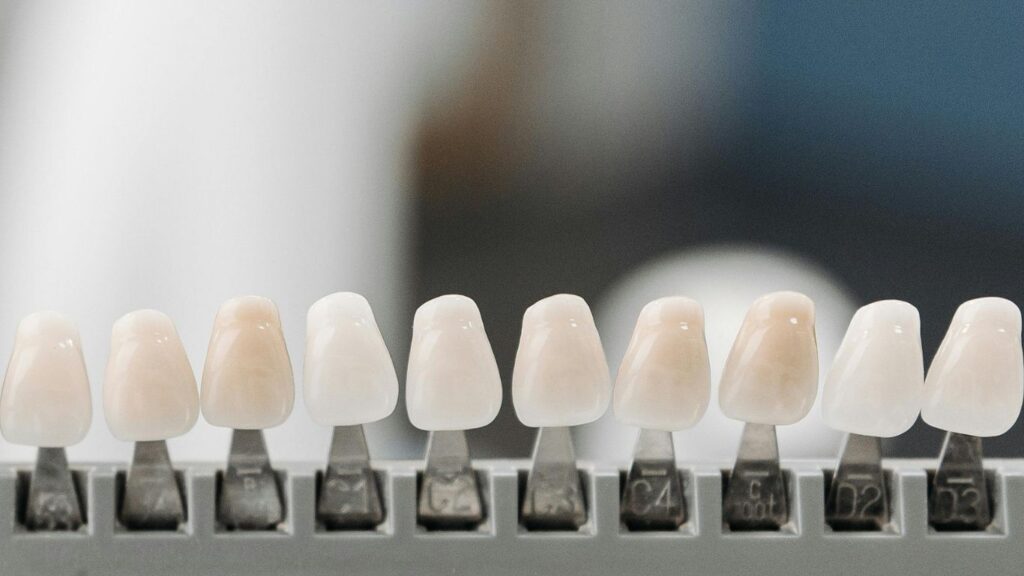Dental Veneers
Avarage Time Needed
Anesthesia Type
Average Session Required
Recovery Time

Online Consultation
What Are Dental Veneers?
Dental veneers are used when there is a loss of tooth tissue due to too much loss of material in the teeth, when there is a loss of tooth tissue due to reasons such as caries and fractures, or for aesthetic purposes. Dental veneers are planned individually because each person has a different mouth and tooth structure. Dental veneers can be applied for functional or aesthetic purposes. For aesthetic purposes, dental veneers can be applied in cases of tooth decay, broken tooth filling, tooth extraction and treatment of cavities in the mouth.
Functional dental veneers, on the other hand, are performed for tooth deficiency, loss of material in the teeth or fractures, abrasions or to strengthen the teeth.
How Do Dental Veneers Work?
Dental veneers function by adhering to the natural tooth surface, creating a seamless and aesthetically enhanced appearance. The process involves minimal enamel removal, ensuring a secure fit while preserving the integrity of the tooth structure. Once bonded, veneers offer durability, stain resistance, and an improved overall smile.
At Denthub, our expert dentists ensure that veneers are custom-crafted to match the natural shape, size, and color of your teeth for the best possible results.

What Are the Different Types of Dental Veneers?
Dental veneers are thin shells placed on the front of teeth to enhance appearance. They correct problems like stains, chips, or gaps. Different types of veneers serve various needs, and each type offers unique benefits. Below are the main options available.
- Porcelain Veneers: Porcelain veneers are very popular due to their natural look and durability. They resist stains better than other types and typically last for many years. The dentist removes a small layer of enamel before placing these veneers. This ensures a snug, comfortable fit and a pleasing appearance.
- Composite Resin Veneers: Composite resin veneers can fix minor issues like small chips or cracks. They require less enamel removal than porcelain veneers. Dentists apply composite material directly onto the tooth and shape it for the ideal look. These veneers cost less but may not last as long.
- Lumineers: Lumineers are a type of ultra-thin porcelain veneer. They need little to no enamel removal, making them a less invasive choice. While they provide a quick solution, not everyone is a good candidate. A dentist must check tooth shape and placement before suggesting Lumineers.
- No-Prep Veneers: No-prep veneers involve minimal or zero tooth alteration. They are thin but strong. Since there is little drilling, some people find this method more comfortable. However, they may not work well for all smile types.
- Temporary Veneers: Temporary veneers are used while you wait for permanent ones. They protect the prepared teeth and give an idea of the final result. Though short-term, they help you continue daily life with confidence.
Who Is a Good Candidate for Dental Veneers?
Dental veneers can solve many cosmetic concerns. They hide discoloration, chips, and uneven spacing. However, not everyone is an ideal candidate for veneers. Before deciding, a dentist will review your oral health and specific goals. Below are common factors that make someone a good fit for veneers:
- Healthy Teeth and Gums: Your teeth must be free from severe decay or large fillings. If you have gum disease, you need to treat it before getting veneers. Healthy foundations support veneers better and reduce the risk of complications.
- Minor Cosmetic Issues: Veneers work best for moderate chips, cracks, or stains. They also fix small gaps or slightly crooked teeth. If major orthodontic work is needed, your dentist might suggest braces or other treatments first.
- Adequate Tooth Enamel: A thin layer of enamel is usually removed to place veneers. This helps the veneer bond well and look natural. If you do not have enough enamel, veneers may not adhere properly.
- Good Oral Hygiene: Regular brushing, flossing, and dental check-ups help maintain your veneers. If you already practice good oral care, you are more likely to benefit from veneers. Poor habits increase the risk of future tooth and gum problems.
What Is the Procedure for Getting Dental Veneers?
Below are the typical steps involved in getting dental veneers:
- Consultation: During your first visit, you talk to your dentist about your smile goals. The dentist examines your teeth and gums to ensure veneers are right for you. They may take X-rays or discuss other treatments if needed.
- Preparation: Once you decide to proceed, the dentist gently removes a tiny layer of enamel from each tooth. This makes space for the veneer so it looks natural and does not feel bulky. They often numb the area to keep you comfortable.
- Impressions: After preparing the teeth, the dentist takes impressions or digital scans. This helps create veneers that fit perfectly. The molds or scans are then sent to a dental lab, where experts design custom veneers that match the shape and color of your teeth.
- Temporary Veneers: Your dentist may place temporary veneers to protect your teeth while waiting for the permanent ones. Temporary veneers also let you preview how your new smile might look.
- Fitting and Bonding: Once the lab finishes your permanent veneers, you return to the dentist. They make sure the color and fit are correct. A special adhesive is applied to your tooth, and the veneer is placed on top. A curing light hardens the adhesive.
- Final Touches
Your dentist checks your bite and polishes the veneers. If any adjustments are needed, they fix them right away. Once finished, you have a bright, natural-looking smile.
How Long Do Dental Veneers Last?
The lifespan of crowns is closely related to the patient’s oral and dental care. If the patient brushes and flosses his/her teeth very well, if he/she has proper dental hygiene and does not neglect regular dental examinations, the crowns can be used for 10-15 years.
What Are the Benefits of Dental Veneers?
Dental Veneers are often chosen by people who want a brighter or more even smile. Below are the key benefits of dental veneers:
- Natural Appearance: Veneers mimic the look and shine of natural teeth. Porcelain veneers, in particular, reflect light similarly to tooth enamel. This allows them to blend seamlessly with your other teeth.
- Fix Multiple Cosmetic Issues: Veneers address several concerns at once. They cover stains, chips, gaps, and minor alignment problems. If you have multiple cosmetic issues, veneers can be a one-stop solution.
- Stain Resistance: Porcelain veneers resist discoloration more than natural teeth. They do not absorb dark pigments from coffee, tea, or red wine as easily. This helps your smile stay bright for a longer time.
- Long-Lasting Solution: With proper care, veneers can last for many years. Regular brushing, flossing, and dental check-ups help extend their lifespan. By taking good care of them, you protect your investment.
- Minimally Invasive: Dentists remove only a small layer of enamel to place veneers. This is less invasive than procedures like crowns, which require more drilling. A little enamel removal ensures a snug fit without damaging your tooth structure.
- Boosted Confidence: A beautiful smile often leads to a boost in self-esteem. People who feel good about their teeth are more likely to smile and interact comfortably. Veneers can provide a positive impact on your personal and professional life.
Are There Any Risks or Downsides to Dental Veneers?
While veneers offer many benefits, there are some potential drawbacks:
- Irreversible enamel removal
- Sensitivity to hot and cold foods
- Risk of chipping or cracking
- Not suitable for those with severe dental issues
How Much Do Dental Veneers Cost?
The cost of dental veneers can vary significantly based on several factors, including the material used, the location of the dental clinic, and the expertise of the dentist. Additional costs may also arise depending on preparatory treatments required. Consulting with a qualified dentist will provide a personalized estimate tailored to individual needs.
The price for veneers depends on the material used, the number of teeth treated, and the complexity of your case. Below are some price examples to help you understand the costs:
- Laminate Emax Veneer (£250 per tooth)
Emax veneers are known for their strong ceramic material and natural look. Their durability makes them popular for people seeking long-lasting results. The cost usually covers the veneer itself, along with the lab work needed to craft a custom fit. - Composite Bonding (£120 per tooth)
Although not always called a “veneer,” composite bonding can serve a similar purpose. It uses a tooth-colored resin material to fix small chips or gaps. The cost is lower compared to Emax veneers, but the material may not be as durable or stain-resistant over time. - Additional Considerations
- Zirconia Crown (£190 per tooth): A crown can act like a veneer if you have more severe damage, but it usually covers the entire tooth.
- Veneer Crown (Metal Crown) (£130 per tooth): This option might be suitable for back teeth or areas where appearance is less critical.
When thinking about the total cost, factor in any extra procedures you might need. For example, you may require a professional cleaning or fillings before veneer placement. Also, consider follow-up visits, since checking the fit and condition of your veneers is vital for long-term success.
In the end, investing in veneers often leads to a more confident smile. By comparing prices and materials, you can pick a treatment that matches your budget and achieves the look you want.
How Should You Care for Your Dental Veneers?
Dental veneers can give you a brighter, more even smile. However, they need proper care to stay in good shape for a long time. Below are some simple tips to protect your dental veneers:
- Brush and Floss Daily: Just like natural teeth, veneers require regular cleaning. Use a soft-bristled toothbrush and non-abrasive toothpaste to avoid scratches. Floss gently between your teeth, paying extra attention to the edges of your veneers to remove plaque buildup.
- Avoid Hard or Sticky Foods: Veneers are strong, but they are not indestructible. Chewing ice, hard candy, or popcorn kernels can damage the porcelain or composite material. Sticky candies can pull at the edges, loosening the bond over time.
- Limit Staining Foods and Drinks: Dark-colored beverages such as coffee, red wine, or tea can cause discoloration. While veneers resist stains better than natural teeth, the bonding material around them can still absorb color. Rinsing your mouth with water after drinking dark beverages helps minimize staining.
- Wear a Mouthguard if Necessary: If you grind your teeth at night or play contact sports, a mouthguard protects your veneers from chipping or cracking. Talk to your dentist about a custom-fitted guard for the best fit and comfort.
- Attend Regular Dental Check-ups: Frequent visits to the dentist ensure early detection of any issues like loose veneers or gum problems. Your dentist can professionally clean and polish your veneers, helping them maintain their shine.
Can Dental Veneers Be Removed or Replaced?
Yes, dental veneers can be removed or replaced, but the process requires professional care. When a dentist places veneers, they often remove a thin layer of enamel. This step ensures a secure bond and natural look. However, because enamel does not grow back, a tooth that has been prepared for a veneer will usually need another type of restoration if the veneer is removed.
If a veneer becomes damaged over time—by chipping, cracking, or staining—the dentist can replace it. First, they carefully remove the old veneer and clean the surface of the tooth. Any remaining adhesive is smoothed away. Next, they take impressions or digital scans to create a new custom veneer that matches your surrounding teeth. Once ready, the replacement is bonded to your tooth. This keeps your smile looking consistent and protects the exposed surface underneath.
In some situations, patients might want to switch from composite veneers to porcelain for more durability or a better appearance. Replacing veneers in this way follows the same basic steps: removing the original layer, making impressions, and placing a new set of veneers. Throughout the process, your dentist will check the fit and color of each veneer to ensure a comfortable bite and natural look.
If you are thinking about removing your veneers entirely and not replacing them, talk to your dentist about other treatment options. Because some enamel is already removed, you may need crowns or other restorations to keep your teeth protected and functional. Regular check-ups will help you maintain the best possible results over time.
What Are the Alternatives to Dental Veneers?
Dental veneers can brighten your smile and correct minor flaws. However, they are not the only option. Other treatments also help improve the look of your teeth without using veneers. Below are some common alternatives to dental veneers:
- Teeth Whitening: Professional whitening treatments remove or reduce stains on your natural teeth. This is a good choice if discoloration is your main concern. Whitening can be done at a dental clinic or at home with custom trays. It is non-invasive and does not require enamel removal.
- Composite Bonding: Composite bonding uses a tooth-colored resin to fix chips or small gaps. The dentist applies the material directly to your tooth, shaping and hardening it for a natural look. This method is typically less expensive than veneers. However, it may not last as long and can be more prone to staining.
- Orthodontic Treatments: If you have crooked teeth or large gaps, braces or clear aligners like Invisalign may be more suitable. These treatments straighten your teeth over time without removing enamel. While the process can take longer, the result often lasts a lifetime with proper retainer use.
- Dental Crowns: A crown covers the entire tooth and is often used for teeth with extensive damage or large fillings. Crowns can improve the tooth’s shape and color, but they require more enamel removal than veneers. Dentists typically recommend crowns for weak or severely decayed teeth.
How Do Dental Veneers Compare to Other Cosmetic Dental Procedures?
While veneers can create a bright, uniform smile, other cosmetic treatments may also meet your needs. Below is a brief comparison between dental veneers and other cosmetic dental procedures:
- Teeth Whitening
- Procedure: Uses bleaching agents or laser treatments to remove surface stains.
- Comparison: Less invasive and more affordable than veneers, but does not fix chipped or misshapen teeth.
- Composite Bonding
- Procedure: The dentist applies tooth-colored resin to repair chips or close small gaps.
- Comparison: Less expensive and can be completed in one visit. However, the material is not as durable or stain-resistant as porcelain veneers.
- Dental Crowns
- Procedure: Covers the entire tooth, often used for severely damaged or weakened teeth.
- Comparison: Offers strong protection but requires more enamel removal. Veneers require minimal tooth reduction in most cases.
- Orthodontic Treatments (Braces or Clear Aligners)
- Procedure: Straightens teeth gradually, realigning them over months or years.
- Comparison: Veneers can mask slight crookedness quickly, but orthodontics addresses the underlying alignment problem. If you have serious misalignment, braces or aligners might be a better solution.
What Is the Recovery Process Like After Getting Dental Veneers?
Dental veneers can transform your smile, but proper care during the recovery phase is important. Right after your appointment, you may feel some numbness if local anesthesia was used. Take extra care when chewing or drinking hot beverages until the numbness wears off to avoid accidental bites or burns.
For a few days you might notice slight tooth sensitivity, especially with hot or cold foods. This is normal because a thin layer of enamel was removed to place the veneers. Over-the-counter pain relievers and desensitizing toothpaste can help manage any discomfort. If pain persists or worsens, contact your dentist.
It is also common to have minor gum tenderness. A saltwater rinse can soothe the area and keep it clean. Brush gently around the veneers using a soft-bristled toothbrush. Floss daily to prevent plaque buildup near the gum line. Proper oral hygiene helps maintain the long-lasting bond between the veneer and your tooth surface.
Stick to softer foods for the first few days and avoid biting directly into very hard or sticky items, such as raw carrots or chewy candy. This precaution helps you avoid damaging the veneers or irritating sensitive areas. After about a week, you can usually return to your normal diet.
Lastly, schedule a follow-up visit with your dentist. They will check how the veneers have settled and make any small adjustments if needed. Regular dental check-ups, combined with good at-home care, ensure that your new veneers stay in top shape and give you a confident smile for years to come.
How to Choose the Right Dentist for Dental Veneers?
Choosing a qualified professional is essential for achieving the best results. We recommend consulting with Denthub, where experienced dentists specialize in veneer applications.
Online Consultation






